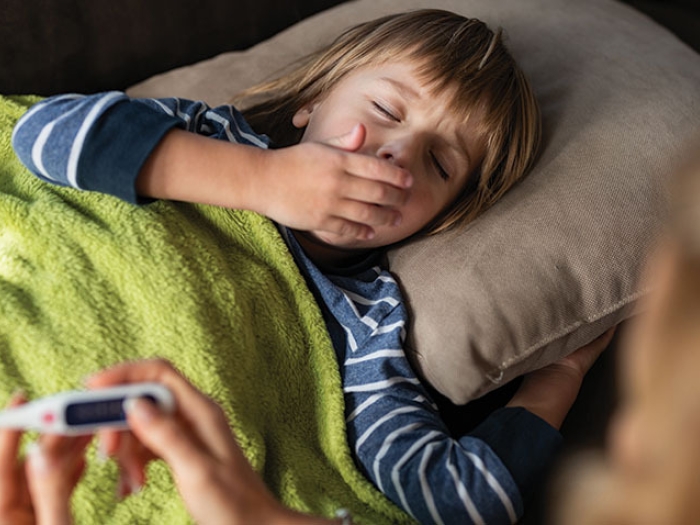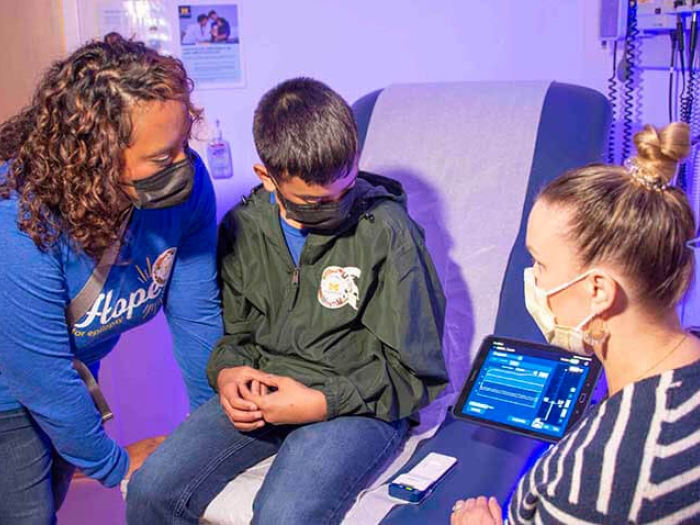Children might feel nervous or scared in health care settings. A simple solution? Play.
5:18 PM
Author |
There's nothing more universal to childhood than play.
In addition to the obvious fun factor, though, there's a bonus. Play promotes expression of feelings and exposes kids to new concepts and information in a comfortable, nonthreatening way.
For kids in medical settings, play can be a powerful tool.
"We know that fear of the unknown can be really strong, so we work with families to use play as a teaching tool, to help them understand what is happening and what to expect," says Aliza Scheier, Certified Child Life Specialist at C.S. Mott Children's Hospital.
Medical play, or therapeutic play, is one of the most time-tested forms of procedural support that child life specialists use as a nonthreatening way to familiarize kids with the health care environment.
Medical play can take many forms — from interactive puppet shows to dolls to re-enactments of medical procedures. Frequently, child life specialists use play as a way to rehearse medical procedures and help a child claim a sense of control over their experiences.
"We use dolls or teddy bears to demonstrate how medical objects are used. For example, we may tape an IV catheter to a doll's arm, or show how a chest tube is inserted.
"It's not uncommon for kids to practice something like giving a doll an IV over and over and over again," says Scheier. "Learning all the steps helps them feel less helpless, as though they're part of the process instead of a passive recipient of pokes and procedures."
For most patients and families, we see a drop in nerves as they learn and understand what will be happening. It can really be a game changer for some kids.Aliza Scheier, Certified Child Life Specialist
The science of play
Medical play can also give specialists an opportunity to watch for signs of anxiety as indicators of things that may be particularly concerning about an upcoming procedure.
"The whole time we're playing, we are answering questions and helping address any misconceptions before they turn into major sources of anxiety. And if we do uncover a misconception a patient may have about what happens during a procedure, we can help clear things up for them," says Scheier. "For most patients and families, we see a drop in nerves as they learn and understand what will be happening. It can really be a game changer for some kids."
Helping kids feel better about their procedures is about more than just improving their emotional experience. Evidence points to a medical impact as well.
Apprehension about a procedure can be accompanied by a number of responses, such as palm sweating, fidgeting, escalating pulse and high blood pressure.
Research has shown that children who engage in therapeutic play show less signs of distress, lower pulse and less palm sweating. In some cases, clinicians are even able to reduce the amount of sedation needed. One study, for example, noted a shorter period of time between surgery and the first time a child is able to empty his or her bladder.

Taking play with you
Families can play a big role in helping a child prepare for a medical procedure.
"Even children without medical conditions can benefit from some forms of medical play," says Scheier.
Toddlers, for example, can become more comfortable with visits to their doctor by grasping and exploring play medical equipment such as stethoscopes or otoscopes.
For older kids, you can experiment with different variations of the following:
-
Act out what a visit to the doctor's office or hospital might consist of, using dolls or puppets
-
Create art collages with Band-Aids or pictures of other medical items from magazines, or use tongue depressors for art projects
-
Check out books about similar health care experiences
-
Use syringes to paint with or for water play
-
Make a storybook about going to the doctor's office or hospital
-
Play games that help kids learn about the body
-
Try experiments that demonstrate things like pulse
When using dolls to simulate a medical procedure, allow your child to control the pace. Listen and support your child without asking too many questions.
What you learn from medical play at home could help you advise the care team at the hospital, in fact.
"You know your child best. You know what their needs are and can work with the staff at Mott to help calm a child's nerves," says Scheier.
Scheier also advises that parents take the opportunity to learn as much about an upcoming procedure as they need to so they can manage their own anxiety.
An anxious parent or family member can definitely affect the child. Your child's medical team can usually provide materials in advance of a procedure.
"Parents often find that therapeutic play helps them as much as it helps the child. Seeing your child get a sense of mastery about what they'll experience and exert some control over a situation can be a very positive experience for family members," she says.

Explore a variety of health care news & stories by visiting the Health Lab home page for more articles.

Department of Communication at Michigan Medicine
Want top health & research news weekly? Sign up for Health Lab’s newsletters today!





